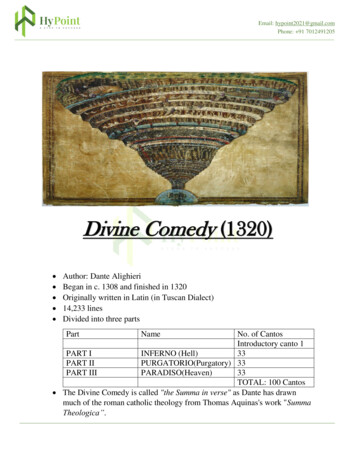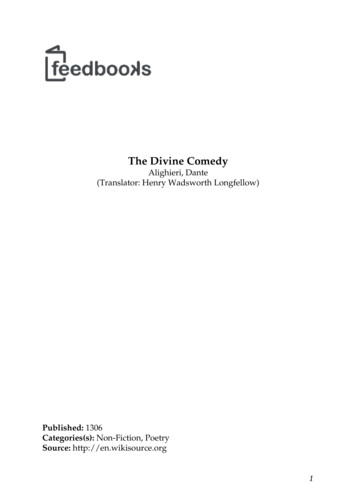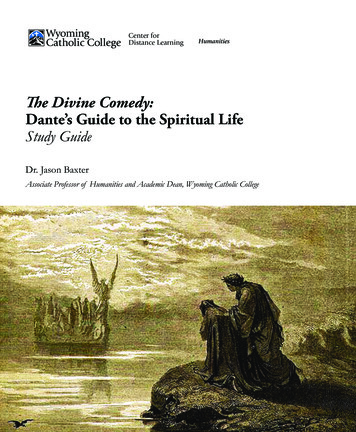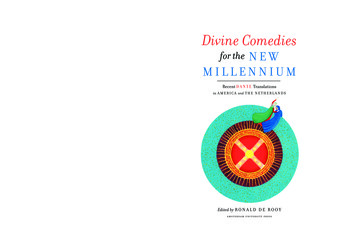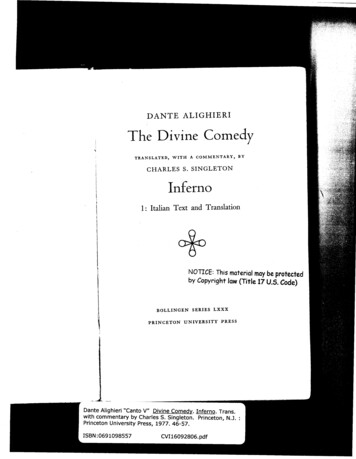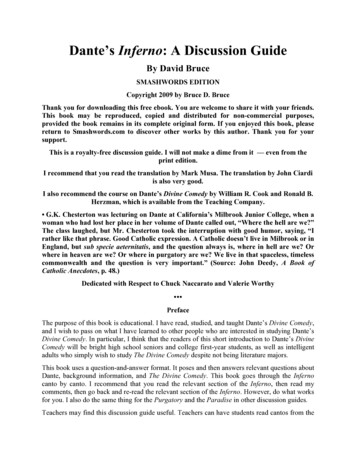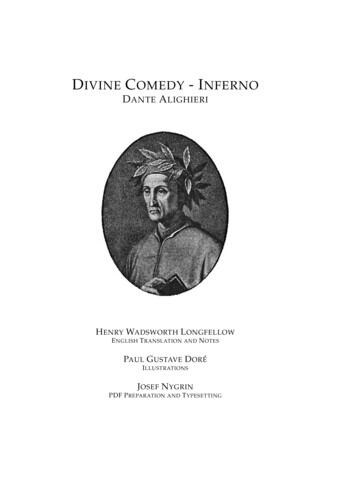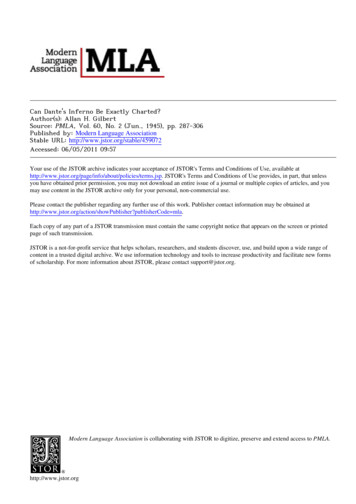
Transcription
THE D IV INE C O M E DYda nte a l i ghi e r iA new translation byJ.G. NicholsWith twenty-fourillustrations byGustave DoréAL MA CL AS S I CS
alma classics ltdLondon House243-253 Lower Mortlake RoadRichmondSurrey TW9 2LLUnited Kingdomwww.almaclassics.comThis translation of the entire Divine Comedy first published by Alma Classics Ltd in 2012The translation of Inferno first published by Hesperus Press in 2005; published in a revisededition by Alma Classics Ltd (previously Oneworld Classics Ltd) in 2010The translation of Purgatory first published by Alma Classics Ltd (previously OneworldClassics Ltd) in 2011Translation, notes and extra material J.G. Nichols, 2012Cover image: Gustave DoréPrinted in Great Britain by CPI Group (UK) Ltd, Croydon, cr0 4yyTypesetting and eBook conversion by Tetragonisbn: 978-1-84749-246-3All the pictures in this volume are reprinted with permission or pre sumed to be in the publicdomain. Every effort has been made to ascertain and acknowledge their copyright status, butshould there have been any unwitting oversight on our part, we would be happy to rectifythe error in subsequent printings.All rights reserved. No part of this publication may be reproduced, stored in or introducedinto a retrieval system, or transmitted, in any form or by any means (electronic, mechanical, photocopying, recording or otherwise), without the prior written permission of thepublisher. This book is sold subject to the condition that it shall not be resold, lent, hiredout or otherwise circulated without the express prior consent of the publisher.
CONTENTSThe Divine Comedy 1Inferno 3Purgatory 165Paradise 329Extra Material 493Dante Alighieri’s Life 495Dante Alighieri’s Works 498Inferno 501Purgatory 504Paradise 509Select Bibliography 516Note on the Text and Acknowledgements 517Index 519
C an to IThis canto, the prologue to Dante’s journey through the Inferno, acts also as an introductionto The Divine Comedy as a whole.At the age of thirty-five Dante realizes he is lost in a dark, terrifying wood. He takesheart when he sees in front of him a hilltop shining in sunlight. But, as he starts to climbthe hill, he is frightened by a leopard which obstructs him in a threatening manner, andthen by an angry lion, and finally by a she-wolf – the most alarming animal of the three. SoDante is driven back into the darkness which – as we soon come to realize about everythingin this poem – is both real and allegorical. (There are, throughout this poem, many kindsof allegory. For instance, the leopard, the lion and the she-wolf – emblems rather thansymbols, and therefore in need of interpretation – are of a different order from the darkwood, whose import is obvious.)A human figure approaches, and Dante, uncertain whether it is a living being or aghost, implores its help. The figure explains that he is the shade of Virgil. This is the poetwhom Dante, as he is quick to declare, admires more than any other. Virgil encouragesDante, and explains that he must travel by a different road if he is to find a way out ofhis difficulties.After making an obscure prophecy about the coming of a hound which will kill the shewolf and also be the saviour of Italy, Virgil says that he will guide Dante through the realmsof the Inferno, inhabited by the souls of the damned, who are beyond all hope; and alsothrough Purgatory, where the souls of those now doing penance for their sins are residing,glad to suffer because they have the certain hope of going ultimately to Paradise. Virgil,because he was a pagan who lived and died before Christ and so could not believe in Him,cannot accompany Dante into Paradise. But he says there is another guide who will takeDante there. Dante accepts Virgil’s guidance, and they set off.0Halfway along our journey to life’s endI found myself astray in a dark wood,Since the right way was nowhere to be found.How hard a thing it is to express the horrorOf that wild wood, so difficult, so dense!Even to think of it renews my terror.It is so bitter death is scarcely more.But to convey what goodness I discovered,I shall tell everything that I saw there.How I got into it I cannot say: I’d fallen into such a heavy sleepThe very instant that I went astray.But when I came beneath a steep hillside –Which rose at the far end of that long valleyThat struck my stricken heart with so much dread –I lifted up my eyes, and saw the height510
inferno i, 17 – 54Covered already in that planet’s rays1Which always guides all men and guides them right.And then the fear I felt was somewhat less,Though it had filled my heart to overflowing 20The whole night I had spent in such distress.And as somebody, trying to get his breath,Emerging from the sea, now safe on shore,Turns round to look at where he cheated death,Just so inside my mind, which was still fleeing,I turned to look again upon that passWhich never left alive one human being.When I’d rested my body for a time,I made my way across deserted foothills,Keeping my low foot always the more firm.2 30And then, just where the hill began to rise,I saw a leopard, light upon its paws,Covered all over in a spotted hide!3It would not move, but stood in front of me,And so obstructed me upon my journeyI kept on turning round to turn and flee.By then it was the first hour of the morning,With the sun rising in the constellationThat came with him when stars we still see burningWere set in motion by divine love first.4 40And so I had good cause to feel encouraged –About the lithe and gaily coloured beast –By that glad time of day and time of year.But not so much encouraged that a lionFailed to inspire alarm as it drew near.It did seem that the beast was drawing near,With head held high, and so irate with hungerThe air itself seemed shivering in fear.5And then a she-wolf! Though she was so lean,She looked about to burst, being crammed with cravings, 50She who’d made many draw their breath in pain.6The pain she caused me was so terrible,And such the terror coming from her sight,I lost all hope of climbing up the hill.123456According to the Ptolemaic system, accepted in Dante’s time, the sun was one of severalplanets revolving round the earth. The dark wood and the comforting sunlight mark thebeginning of that symbolism of light and darkness which runs through the whole Comedy.He was climbing.This leopard is an embodiment of the sin of lust, or sensuality in general, commonlyassociated with youth.It was a common medieval belief that, when the world was created, the season wasearly spring, with the sun in the constellation of Aries.The lion embodies the sins of wrath and pride, commonly associated with middle age.The she-wolf embodies the sin of avarice, commonly associated with old age.6
inferno i, 55 – 93And like that miser, happy while he’s gaining,Who when luck changes and he starts to lose,Gives himself up to misery and moaning –That’s how I was, faced by that restless brute,Which always coming nearer, step by stepDrove me back down to where the sun is mute.1 60Then suddenly, as I went slipping down,Someone appeared before my very eyes,Seemingly through long silence hoarse and wan.2When I caught sight of him in that wide waste,“Take pity on me,” I shouted out to him,“Whatever you are, a real man or a ghost!”He answered: “Not a man, though I was once.Both of my parents came from Lombardy,And both of them were native Mantuans.I came to birth sub Julio, rather late,3 70And lived in Rome under the good Augustus4When false, deceptive gods still held their state.I was a poet, and I sang the goodSon of Anchises who came out of TroyWhen Ilium was burned in all its pride.5But you, why d’you go back to misery?Why don’t you climb up the delightful mountain,The origin and cause of perfect joy?”“Then are you Virgil, you, that spring, that streamOf eloquence, that ever-widening river?” 80I answered, red with reverence and shame.“Oh every poet’s glory and guiding light!May I be aided by the love and zealThat made me turn your pages day and night.You are my only master and my author,You only are the one from whom I tookThat style which has bestowed on me such honour.You see the beast that made me turn in flight.Save me from her, O famous fount of wisdom!90She makes the blood run from my veins in fright.” “Now you must travel by a different road,”He answered when he saw that I was weeping,“If you wish to escape from this wild wood.12345As an example of synaesthesia this may at first seem more striking than apt, but duringthe course of the Comedy light, or the lack of it, “speaks” volumes.This is the shade of someone who has been dead a long time.When Caesar was dominant in Rome, but too late to be acquainted with him.The Emperor Augustus.This is Virgil, and the poem he refers to is his Aeneid, whose hero, Aeneas, a refugeefrom Troy (or Ilium), is the son of Anchises. The theme of the Aeneid, the events leadingup to the foundation of Rome, was particularly dear to Catholic Europe because Romeeventually became the seat of the Papacy.7
inferno i, 94 – 130This beast, the reason that you cry out loud,Will not let people pass along this way,But hinders them, and even has their blood.She is by nature such an evildoerHer avid appetite is never slaked,And after food she’s hungrier than before.And many are the beasts she’s mating with,1 And there’ll be many more, until the hound2Arrives, to bring her to a painful death.This hound will not be fed with land or pelf,But rather feed on wisdom, love, and valour.He will originate in folds of felt.3He’ll be the saviour of low-lying landsOf Italy for which Camilla died,Turnus, Nisus, Euryalus, of their wounds.4This hound will hunt that creature high and lowUntil he thrusts her back in the Inferno, Whence envy freed her first and let her go.I therefore think and judge it would be bestFor you to follow me. And I shall leadYou to a region that will always last,Where you will hear shrieks of despair and grief,And see the ancient spirits in their pain,As each of them begs for their second death.And you’ll see spirits happy in the fire,Because they live in hope that they will come,Sooner or later, where the blessèd are. And if you wish to join that company,One worthier than I will take you up.5I’ll leave you with her when I go away.That Emperor who has His kingdom there6Lets no one come through me into his city,Because I was a rebel to his law.7He governs all creation, ruling whereHe has His capital and His high throne.Happy are those he chooses to have there!”I answered: “What I beg of you is this – 1234567100110120130Many people will indulge in the sin of avarice.Variously interpreted as a political or religious saviour (there are many candidates) or– most satisfactorily – as a prophecy left deliberately vague.Again obscure, but as translated here it suggests a humble origin.All characters in the Aeneid.Beatrice, the woman loved by Dante in his youth and a lasting means of grace leadinghim to God. Dante’s own account of his love, Vita Nuova (New Life), a work in prosewith lyrics interspersed, is by far the best introduction to the Comedy.God. In the Inferno God tends to be alluded to rather than named, while Christ is nevernamed.Virgil was a pagan.8
inferno i,131 – 136By that God whom you never knew – so thatI may escape this evil and much worse,Take me to both those places as you said,To see the gate kept by St Peter1 andThose souls you say are desperately sad.”2Then he set off. I followed on behind.12Either the gate of Purgatory, guarded by an angel obedient to St Peter, or the gate ofParadise.Those in the Inferno.9
C an to I IThe sun is now setting. This is a time when most creatures settle down to rest. Dante, however,is preparing himself for the coming day-long journey and its hardships.He invokes the Muses to help him give a true account of his journey. Then he tells Virgilhow he doubts his own ability to complete the task, and expresses his perplexity as to whyhe has been chosen for such an unusual enterprise. He can understand why Aeneas waschosen, the man of destiny who was to found the race that founded Rome, the ruling cityof a great empire and the seat of the Holy See. But Dante cannot think that any such destinyis prepared for him. He can understand too why St Paul was taken temporarily into Heavenwhile still alive. But no one could believe that Dante is worthy of such a favour.To these doubts Virgil replies by saying that Dante is simply afraid. To combat Dante’sfear he will explain how he came to help him. Beatrice came to him in Limbo and asked forhis help to save Dante from damnation. She promised in return to praise Virgil frequentlyin the presence of God. In answer to Virgil’s question, Beatrice explains how she was notafraid to venture down from Heaven: the souls in bliss are not tormented by earthly things.Beatrice describes how Mary, the Mother of Christ, had asked St Lucy to help Dante, andSt Lucy then asked her.With three such ladies caring for him (an outstanding example of the communion of thesaints, in contrast to the lack of a sense of community we find in the Inferno) Dante musthave nothing to fear. Duly encouraged, Dante sets off with Virgil.0The light was failing, and the growing gloomRelieving every creature on the earthOf all its toil and trouble. I aloneWas getting ready to endure the stressBoth of the road and the resultant anguish,Which never-erring memory will rehearse.O Muses, O my genius, lend me aid!O memory, who wrote down what I saw,Here your capacity will be well tried!I started: “Poet, you who are my guide, Consider if I have the strength and skill,Before you set me on this rugged road.The father of Silvius,1 as you tell it, whileHe was corruptible, travelled beyondThis world of ours, being still corporeal.And, if the enemy of all that’s badDid favour him, because of who he wasAnd what he was, and what at last he did,That must, to men of sense, seem not unfair,Since he was chosen in the highest heaven 11020Aeneas, the hero of the Aeneid. In the sixth book of that poem Aeneas journeys throughthe underworld and is rewarded with a prophecy of the future glory of Rome.10
inferno ii, 21 – 62As father of great Rome and Rome’s Empire.The City of Rome, to tell the truth of it,Was destined to become that sacred placeWhere his successor1 sits in Peter’s seat.On this strange journey you ascribe to him,He heard of things that were to bring aboutHis triumph and the papal power in Rome.That is a road the Vessel of Election2Went upon also, strengthening the faithWhich starts us on our journey to salvation. But why should I go there? By whose decree?Aeneas I am not, and not Paul either.That I am worthy no one would agree.And so, if I agree to go that way,I am afraid of being overbold.You’re wise. You understand more than I say.”Just as one is who unmeans what he meant,Changing that mind of his on second thoughts,Wholly diverted from his first intent –That’s how I stood upon that gloomy slope: By thinking through it, I’d consumed the ventureFor which I was so eager starting up.“If I have understood your words aright,”Answered the shade of that high-minded man,“Your cowardly soul has simply taken fright.Fear often faces men with obstaclesTo make them turn from honourable endeavours,As beasts fear shadows when the daylight fails.That you may lose this fear and so come through,I’ll tell you why I came, and what I learnt At the first instant when I pitied you.I was among those souls who are suspended.3A lady called to me, so bright and blessedI asked her to make known what she commanded.Her eyes were shining brighter than the stars.She spoke in her own tongue, in gentleness,And said in that angelic voice of hers:‘O Mantuan soul, the soul of courtesy,Whose glory is still current in the world,And shall endure till this world cease to be, This friend of mine (though not a friend of fate)Is so encumbered on the lonely hillside12330405060St Peter’s successor, the Pope.St Paul, the “chosen vessel” mentioned in Acts 9:15. Paul himself describes how “he wascaught up into paradise” (2 Cor. 12:2–4).In Limbo, described in Inf. iv. Limbo is the part of the Inferno reserved for those whohad lived virtuously but were not baptized, and so are held in suspense between theirdesire for God and the impossibility of ever seeing Him.11
inferno ii, 63 – 102He has been driven from his path in fright.It could be that he has already strayedSo far I’m here too late to give him succour,Judging by what in heaven I have heard.Now go, and with your noted eloquence,And everything he needs for his escape,Come to his aid. I shall take comfort thence.For I am Beatrice putting you to work. I come from where I’m anxious to return.Love urged me on to this – Love makes me speak.When I’m once more in presence of my Lord,I’ll sing your praises to him frequently.’At that point she fell silent. Then I said:‘O lady full of virtue, and through whomThe human race surpasses everythingBeneath the narrow circle of the moon,1I am so gratified by what you order,If I’d obeyed already I’d be tardy. There is no need to express your wishes further.But tell me first the reason you don’t spurnDescending to this centre from broad spaces2Where, as you say, you’re anxious to return.’‘Because you feel the urge to understand,I shall explain quite briefly,’ she replied,‘Why I am not too frightened to descend.We should be frightened of those things aloneWhich have the ability to do us evil.Things are not frightening if they do no harm. I’m formed in such a fashion, by God’s grace,That your unhappiness does not affect me.Nor do the fires that rage throughout this place.A lady in heaven3 has such great sympathy,Given the encumbrances through which I send you,That the stern judgement up above gives way.She called on Lucy, and she said to her:“One who is faithful to you now has needOf you, and I commend him to your care.”St Lucy,4 foe to all malignity, Rose at those words and, coming where I satWith venerable Rachel, said to me:1234708090100The moon was considered to be the planet nearest to the earth. All above its orbit wasconsidered everlasting, and all below mortal.“This centre” is the earth, seen in the Ptolemaic system as the centre of the universe.The “broad spaces” refers to the Empyrean, the highest heaven, the sphere farthest fromthe earth.The Virgin Mary.A saint to whom Dante was particularly devoted. Her name is derived from the Latin“lux” meaning light.12
inferno ii,103 – 142“Beatrice, veritable praise of God,Why do you not help him who loved you soThat for your sake he stood out from the crowd?Can you not hear his cries of misery?Can you not see him caught in a death struggleUpon that flood as fearful as the sea?”Nobody in the world was ever so quickTo seek advantage and to run from loss As I, the instant I had heard her speak,Was quick to leave my seat among the blessed,Putting my faith in your fine honest speech,1Which honours you and those who read it best.’As soon as she had said these words to me,She turned her eyes, shining with tears, aside,Which made me the more eager to obey.And so I came since she requested it,And saved you from that savage beast that barredThe short way up the mountain of delight. What is it then? Why do you hesitate?Why do you relish living like a coward?Why cannot you be bold and keen to start?Are not three blessèd ladies, after all,Concerned and speaking up for you in heaven?And does not what I’ve said promise you well?”As tiny blossoms, when the cold night airHas made them droop and close, lift up their headsAnd spread their petals once it’s dawn once more,So I did also, after being exhausted. And such great ardour streamed into my heartThat like somebody freed from fear I started:“Oh how compassionate to bring me aid!And you, how courteous you were! When sheSpoke those true words, how swiftly you obeyed!You have instilled such longing in my heartTo come with you, because of all you say,That I have now gone back to my first thought.Now go, for we are thoroughly at one.You are my leader, my master, and my lord.” Those were my words. And so, as he went on,I started on that rugged, savage road.1Virgil’s poetry, especially the Aeneid.13110120130140
C an to I I IDante sees the terrible words written over the gate of the Inferno, stressing divine justiceand the everlasting nature of the punishment which it inflicts.Dante is understandably perturbed, and Virgil has once again to remind him of the needfor courage to face what lies ahead.Inside the gate there is no light, no quiet, no rest. The damned are running continually,and to no purpose, after a banner whose significance is not specified. The souls here are ofthose who were neither for God nor against Him. Having shown neither the courage nor theenergy to act decisively, they are now not good enough for heaven, and not evil enough forhell. So they exist in a sort of antechamber of the Inferno. As if to emphasize the contemptin which they should be held, not one of these souls is named.Then Dante sees a crowd gathering on the bank of a river, the Acheron. A frightening,demonic boatman, Charon, comes towards them from the opposite bank to ferry themover. He curses them. He also tells Dante that, since he is still alive, he cannot go in thisboat. Virgil silences Charon by mentioning the inescapable nature of the decision which hasbrought Dante there. He explains to Dante that normally only the damned can go that way.As Charon’s boat moves off, another crowd of damned souls is already gathering to beferried across.Suddenly, the earth quakes, there is thunder and lightning, and Dante falls down in a faint.0“12You go through me to a city of lamentation.You go through me to everlasting pain.You go through me to the forsaken nation.Justice inspired my maker up above.I was established by omnipotence,The highest wisdom and the primal love.Nothing before me was created everBut everlasting things.1 And I shall last.Abandon hope entirely, you who enter.”These were the very sentences I eyed, Set out in sombre black above a gate.Then I said: “Master, this seems very hard.”Then he to me, being quick to catch my mood:“Here all misgivings must be left behind,And all your cowardice be left for dead.We come now to the region, as I said,Where you will see the people steeped in sorrow,Those who have lost all intellectual good.”2And then, when he had looked at me and smiled10The angels were created first (creatures who, not being corporeal, are not subject tomortality), and the Inferno was created to receive those angels who rebelled against God.Nothing but the truth, which is God, can satisfy the intellectual longings with whichhuman beings are born.14
inferno iii, 20 – 60And pressed my hand, from which I drew some comfort, 20He introduced me to the secret world.From this point, sighs, laments, and piercing groansWere echoing throughout the starless air.Hearing them this first time, I wept at once.Deformed and diverse tongues, terrible sounds,Words venting misery, outbursts of rage,Loud voices, soft ones, sounds of slapping handsCombined into a turmoil always swirlingThroughout that unrelieved black atmosphere,Like sand which rises at a whirlwind’s whirling. 30And I, my head surrounded by that horror,Said: “Master, what’s this noise that I can hear?Who are these people crushed by what they suffer?”He said: “This is the wretched way of theseSorry creatures: the lives they lived were suchThey earned no infamy, and earned no praise.Now they are mingled with that wicked sortOf angels who were neither with the rebels,Nor true to God, but simply stood apart.The heavens, lest their beauty should be flawed, 40Reject them, whom deep hell cannot receiveLest it should gain some glory on that head.”I asked: “What is it hitting them so hardThat they must answer with such loud laments?”And he replied: “I’ll tell you in a word.These people have no hope of dying ever,And their blind life is so contemptibleThat they would barter it for any other.The world accords them not the least renown.50Pity and justice scorn them equally. Enough of this – you’ve seen them, now pass on.”I saw some kind of banner that was wheeledAround, and racing round at such a rateIt seemed there was no breathing time allowed.And after it there ran so long a lineOf people that I never would have thoughtThat death had gathered such a number in.When I had recognized some of them there,I saw and recognized the shade of himWho made the great refusal, out of fear.1 601There has been much discussion as to who this is. Some say it is Pope Celestine V (r.1294),who resigned the Papacy only five months after his election. Others suggest PontiusPilate, who washed his hands at the trial of Christ. The second seems more appropriate,since this is the only shade in this canto who receives an individual mention, and Pilate’srole in the Passion was so important. The point is that Dante leaves this character unnamed (in a poem which includes so many names) to imply that, since he is one of thosewho lived so unworthily that they “never really existed”, he does not deserve to be named.15
inferno iii, 61 – 103Immediately I understood how thoseWere members of that dire denominationDispleasing both to God and to his foes.All these wretches, who’d never really existed,Went naked and were fiercely goaded onBy blowflies and by wasps that buzzed and twisted.These insects went on stinging them and streakingTheir faces with their blood which, mixed with tears,Flowed down to where obnoxious worms were licking.And then I saw, some way beyond all these, A crowd upon the bank of a broad river.That made me beg of Virgil: “Master, pleaseTell me. Who are they? And what can inciteThem with such eagerness to cross the river,As far as I can see in this dim light?”And he replied: “All will be made quite plainWhen we suspend our journey for a whileUpon the gloomy banks of Acheron.”1So then, with eyes cast down and full of shame,Afraid that I might irk him with my speech, I kept from talking till we reached the stream.At that there came towards us in a boatAn old old man, whose hair was white with age.2“Woe to you, wicked souls!” he shouted out.“Do not expect to see the sky again!I’m here to take you to the further bank,To everlasting darkness, ice and flame.And you, you over there, you living soul!Keep well away from these. All these are dead.”But when he saw I made no move at all, He said: “By other ways, another port,You will arrive on shore, and not this way.You must be carried in a lighter boat.”3My guide said: “Charon, do not fret and fuss.This is wished there where whatsoever is wishedIs always done. There’s nothing to discuss.”The shaggy jowls went silent. Nothing moreCame from the pilot of the muddy river,Who had around his eyes such rings of fire.But those souls – every troubled naked wretch – Changed colour and their teeth began to chatterSoon as they heard his rough-and-ready speech.They cursed their God, their parents in one breath,123708090100The classical river of the dead, which must be crossed to reach the underworld. Its nameis derived from a Greek word meaning “pain” or “distress”.The classical ferryman of the dead. His Greek name is derived from his bright, fierceeyes.The boat which carries the souls of the saved to the island of Purgatory.16
inferno iii,104 – 136All humankind, the time, the place, the seedOf their conception and their very birth.And they huddled together in a crowd,Weeping loudly beside that wicked riverWhich waits for all who have no fear of God.The demon Charon, eyes like glowing embers,Beckons to them and gathers them together, And with his oar he beats whoever lingers.As in the autumn, when the leaves descendOne after the other, till the boughs are leftWith all that clothed them lying on the ground,In the same fashion Adam’s evil seedFlew down towards the river one by one,At Charon’s nod, as birds do when they’re lured.They move away across the murky river,And well before they reach the other bankAnother crowd on this side starts to gather. “My son,” my courteous master then explained,“Those who have died still subject to God’s angerAll come together here from every land.And they are keen to reach the other shore,Because celestial justice spurs them onUntil their fear is turned into desire.1No soul that has been good passes this way.So now, if Charon was annoyed with you,You know exactly what he meant to say.”The instant this was said, the darkened land Shuddered, so violently that once againI’m bathed in sweat, calling it back to mind.Out of the tearful, sodden earth a windBurst with the sound of thunder, sending upSudden vermilion flashes. I was stunned,And sank like someone overcome by sleep.1110120130It is as though the damned, in a very human way, wish to get the suspense over with,even though they are going to their punishment. There is also here a hint of somethingwhich becomes clearer and clearer in the course of the poem: divine justice consists inallowing people to have what they really want, and the damned have chosen damnation.17
C an to I VDante is aroused by a clap of thunder, to find himself on the other side of Acheron. He andVirgil are on the edge of the abyss which is the Inferno proper. Dante’s fear is increased bythe sight of Virgil’s pallor. However, as Virgil explains, this pallor is not the result of fear,but of compassion for those who are suffering below. And so they enter Limbo, the firstcircle of the Inferno.Here nothing can be distinguished at first but the sighs of the damned, who are not herebecause they have sinned, but because they were not baptized. Virgil himself is one of them.They sigh because of their spiritual grief: they endure no physical pain, but a strong andhopeless desire for God.Dante asks if anyone was ever taken from this place to bliss, and finds that Virgil understands what is in his mind. Virgil describes the Harrowing of Hell – the rescue by Christ,after His resurrection, of Old Testament patriarchs, one matriarch and others too
This canto, the prologue to Dante's journey through the Inferno, acts also as an introduction to The Divine Comedy as a whole. At the age of thirty-five Dante realizes he is lost in a dark, terrifying wood. He takes heart when he sees in front of him a hilltop shining in sunlight. But, as he starts to climb

